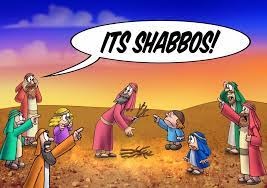Vayakhale 2024: When is the Messiah Coming?
by devadmin | March 7, 2024 8:23 pm
Raboyseyee and Ladies,
When is the Messiah Coming?
One thing is zicher: The RBSO takes the heylige Shabbis very seriously as we will learn once again this week. Let’s begin by quoting the opening pisukim of Parshas Vayakhale which we will read in this leap year as a singleton. Of course you know -from previous editions (check them out at www.Oisvorfer.com)- or, efsher you recall from your many years in yeshiva, that Parshas Vayakhale is mamish a repeat of Parshas Teruma. In Teruma, the RBSO gave Moishe very specific instructions about the building of the Mishkan. Why repeat them here? Why listen to the laining this week? Ver veyst? Of-course we all know that they heylige Toirah does not repeat information, not even one word or letter, unless it does! What’s pshat? It’s azoy: When it does, and it does so quite often, we were also taught that when we do find words and thoughts repeated, there is a good reason. What that reason is, ver veyst?
Limoshol (by way of example) in the heylige Gemora (Buba Metzia 59B) it says, in the name of R’ Elazar HaGadol, that 36 times in Toirah we are warned against the wronging of a convert (46 if you count the times it says “because you were strangers in egypt” and the like -adds Toisfis). The reason given is because a convert has a strong inclination for evil, and you do not want to drive him back to his old ways. 46 reminders? Wow! The RBSO meant business!

And listen to this: The Rimzei Baal HaTurim to Devorim 1:1 (printed in most Chumashim) says this: Warnings against both Idol Worship and Wronging a Convert are mentioned 48 times in the Toirah. it so happens that Rabbi Art Scroll (in the Baal HaTurim Chumish) notes the discrepancy between the Gemora and the Baal HaTurim, but does not explain why. The bottom line: letters, words and concepts are repeated: very often! But our clever sages always find a way of explaining just why repletion is needed. One thing is zicher: many proffer explanations.
At your level, all you need to know is that in Teruma, the Yiddin were instructed to build, and in this week’s parsha, seemingly after a successful building campaign, and after the plans were approved by the various midbar zoning committees, the project gets underway. The Mishkan and all its accoutrements will be built. We have previously covered the major themes of this parsha which include, yet again, the observance of shabbis, the wide array of materials sourced for the project, and the fact that Betzalel, at the tender age of but 13, was appointed the project manager. Why him? Seemingly the RBSO blessed him with unique talents and with the RBSO’s blessings -though under aged and inexperienced- a resume he did not have or submit for the job. The fix was in, the RBSO Himself suggested him the for the job. Shoin, let’s get back to shabbis observance.
Let’s learn innaveynig: “And Moishe assembled all the congregation of the children of Israel, and said to them: These are the words which the Lord has commanded, that you should do them. Six days shall work be done, but on the seventh day there shall be to you a holy day, a shabbis of solemn rest to the Lord; he who does any work therein shall be put to death. You shall kindle no fire throughout your habitations upon the shabbis day.”

Epes these instructions ring familiar and efsher you’re wondering why the mitzvah of shabbis is repeated here, and in general, why shabbis observance gets so much Toirah play. According to most sources, shabbis is mentioned over 80 times in the heylige Toirah. Didn’t we already encounter this mitzvah when the RBSO came down and gave the Yiddin the Aseres Hadibrois (Ten Commandments)? We did! Wasn’t shabbis observance number four on that list? It was! And guess what? In fact, shabbis observance has previously been mentioned in four other places in Sefer Shemois (16:23, 20:7-10, 23:12, and 31:13-17) and will be repeated again later in Sefer Devorim. And the question is this: Why was it necessary to relay this command to the Yiddin once more, and why specify kindling fires?
Ober raboyseyee, to the real students of the heylige Toirah, extraneous and redundant words are the keys which the RBSO left us to unlock the doors to its treasures and the repetition of the shabbis instructions may be one of those keys. You chap this? Repetition makes us dig for answers.
Ober why taka all these reminders and what is the connection between the mishkan project and Shabbis? Says Rashi -and who knew more, azoy: Moishe reminded the Yiddin that it was forbidden to work on shabbis before commanding them to construct the Mishkan, in order to teach them that even the necessities of the Mishkan do not override the heylige Shabbis. Gishmak, ober let’s try another pshat.
Says the Ramban: the mitzvah of shabbis is repeated here in order to emphasize the importance of the RBSO’s day of rest and that even building the mishkan is not דוחה (does not push away) the heylige shabbis. No big news here except this point. Following the eygel debacle, the Yiddin were on their best behavior. Wiping out three thousand a few parshas back, did seemingly put a shtikel scare into them. Seeing that the RBSO can get angry and dispose of people in an instant zicher scared them straight; they were quite eager to serve the RBSO properly. They wanted to build the Mishkan now! Maybe too eager; they were ready to build the project even on shabbis. Ober said the RBSO azoy: chap-nisht (slow down) and reminded them that the heylige shabbis may not be violated.
 Efsher we can kler (speculate) that the RBSO knew -of course He did- that the Yiddin would have trouble with this mitzvah, that Shabbis observance as He envisioned it, would be challenging. Efsher He looked ahead and saw that Yiddin would be taking hot showers on shabbis, riding up and even down elevators -say it’s not so please- and opening their hotel rooms with their electronic keys -albeit with a shenui. He knew they would be schmeering sunscreen all over their bodies before sitting out at the pool on shabbis and yom tov while staring at the halb-nakite (scantily dressed) hot shiksa meydlich at various hotels and Pesach programs. Mistama He also knew that certain Yiddin wouldn’t use the klei shaynee when making coffee on the heylige shabbis, or efsher worse, would be tearing open packets of artificial sweetener. Oy vey! And maybe even tearing toilet paper because the pre-cut paper was either too small or efsher a shtikel too rough on their delicate michilas (rear ends). Maybe He knew that yeshiva bochurim would come down late on Friday night to have some hot chulent, remove the pot from the blech and not put it back when it was still sizzling hot, ver veyst. Oy vey: there are so many examples of chillul shabbis, nebech. What to do? He sprinkled gentle and not so gentle keep-the-shabbis-reminders into a healthy number of parshas; eight to be exact. Of course this is all speculation.
Efsher we can kler (speculate) that the RBSO knew -of course He did- that the Yiddin would have trouble with this mitzvah, that Shabbis observance as He envisioned it, would be challenging. Efsher He looked ahead and saw that Yiddin would be taking hot showers on shabbis, riding up and even down elevators -say it’s not so please- and opening their hotel rooms with their electronic keys -albeit with a shenui. He knew they would be schmeering sunscreen all over their bodies before sitting out at the pool on shabbis and yom tov while staring at the halb-nakite (scantily dressed) hot shiksa meydlich at various hotels and Pesach programs. Mistama He also knew that certain Yiddin wouldn’t use the klei shaynee when making coffee on the heylige shabbis, or efsher worse, would be tearing open packets of artificial sweetener. Oy vey! And maybe even tearing toilet paper because the pre-cut paper was either too small or efsher a shtikel too rough on their delicate michilas (rear ends). Maybe He knew that yeshiva bochurim would come down late on Friday night to have some hot chulent, remove the pot from the blech and not put it back when it was still sizzling hot, ver veyst. Oy vey: there are so many examples of chillul shabbis, nebech. What to do? He sprinkled gentle and not so gentle keep-the-shabbis-reminders into a healthy number of parshas; eight to be exact. Of course this is all speculation.
How important is Shabbis observance? Very! Says the heylige Gemora (Shabbos 118b) azoy: if all the Yiddin would properly observe two consecutive shabbosim, they would immediately be redeemed. What’s pshat redeemed? Seemingly, were this to happen and avada it’s only hypothetical, the Moshiach would make a sudden appearance and we would all live happily ever after. Is that emes? Two shabossim and the Moshiach makes an appearance? Well, blow me down! Mamish an end to the wars in Israel and no more open antisemitism? Well, blow me down.

Ober says the Gemora (Yerushalmi) azoy: when all the Yiddin will keep just one shabbis, the geula (redemption) in the form of Moshiach, will immediately come. Efsher you recall that way back in the 80’s, the Jewish pop star singer Mordechai ben David, not to be confused with Moshiach who is referred to as ben Dovid, wrote and sang the givaldige song by that name: ‘just one shabbis and we’ll all be free.’ Find it here: https://www.google.com/search?gs_ssp=eJzj4tVP1zc0TCozMygvLKgyYPRSyyotLlHIz0tVKM5ITErKL1ZIzEtRKE9Vz8lRSATipFSFtKLUVAD22hJq&q=just+one+shabbos+and+we%27ll+all+be+free&rlz=1C1GCEA_enUS845US845&oq=just+one+shabbis+&gs_lcrp=EgZjaHJvbWUqDAgCEC4YDRjUAhiABDIGCAAQRRg5MgkIARAAGA0YgAQyDAgCEC4YDRjUAhiABDIMCAMQLhgNGNQCGIAEMgkIBBAAGA0YgAQyCQgFEAAYDRiABDIICAYQABgWGB4yBggHEEUYPNIBCDc3MTFqMGo0qAIAsAIA&sourceid=chrome&ie=UTF-8
Ober, which is it? One shabbis or two to bring the Moshiach? Said The Alter Rebbe (one of the early Lubavitcher Rebbes) azoy: it’s but one shabbis. Settled! Ober that one Shabbis contains two Shabbises, or two levels of shabbis, whatever that means. The first level of shabbis is ‘non-doing’, the cessation from everyday work and the second level is ‘doing’, filling the day with prayer, Toirah study, and song. And despite shabbis clocks, timers, hot plates, warming drawers and a healthy number of goyim to turn things on and off in a pinch, seemingly the keeping of even one shabbis by all Yiddin, continues to elude us. In the meantime, alas, we’re still here.

In case you’re taka wondering when Moshiach is coming or scheduled to make an appearance, nu that too depends on which theory talks to you. In case you run out of loshoin horo at the shabbis tish -that too is avada only hypothetical- you can debate the following theories about his arrival. Some scholars believe that the RBSO has set aside a specific date for his arrival. Ober, others suggest that his coming will be determined mamish only by the conduct of mankind. In other words: he’s never coming! Some believe that he will come in a time when he is most needed. When is that? Now would be a good time for the hostages and those fighting. Times like now when the world is mamish in a perilous sate. Ober others say farkert; he might show up in a time when he is most deserved because the world is so good. In other words: he’s never coming! Got all that? No? Let’s chaizir the suggested Moshiach arrival days.
- if the Yiddin (all) were to do tshuva (repent) for a single day
- if the Yiddin observed a single shabbis properly
- if the Yiddin observed two consecutive shabbosim properly
- in a generation that is totally innocent
- in a generation that is totally guilty
- in a generation that loses hope; in a generation where children are totally disrespectful towards their parents and elders
And if all those don’t work -and none have until now- some suggest that he will come before the Jewish year 6,000. For those counting, we are in the year 5784. Still plenty of time to chap areyn, if you chap.
Efsher you’re taka wondering how it’s possible that just by keeping one or even two shabossim the Moshiach, who has eluded us for over 5700 years, would suddenly make an appearance and redeem us. Nu, guess what, you’re not alone. And even if emes, why is shabbis connected to his arrival? And what has this to do with our parsha? Seemingly it is and the answer may well lie in our parsha, lommer lernin.
Said Reb Shimshon Pinkus (Shabbos Malkasa 3:7) azoy: there are many comparisons between the Beis HaMikdash and the heylige Shabbis. First and foremost, the main purpose of the Mikdash was to bring atonement for our sins. And the first ever Mikdash was the Mishkan that was built in this week’s parsha and avada you recall that the Mishkan was built to atone for the giferlich sin of the Eygel (golden calf). Similarly, in the Friday night davening when the chazzan interrupts our talking (for a second) and proclaims “Vayichulu“, two angels place their hands on our heads and remove our sins. Angels place their hands on our collective heads? So says the heylige Gemora (Shabbos 119b), check it out. In any event, angels’ hands on your head is zicher better than the rebbe’s hands on your other head, if you chap. Gishmak!
Ok we chap that the Mishkan was built to atone for the Eygel sin, ober how is this connected to shabbis? What does the sin of the Eygel have to do with shabbis? Ober listen to this mamish gishmak pshat. Said the Or Hachaim azoy: It is significant to note that this mitzvah of shabbis comes on the heels of the ugly Eygel myseh. Says the heylige Toirah (Bamidbar 15:23), azoy: “When you sin and do not do all of the mitzvois…”. Ober which sin could the Yiddin have committed to have transgressed all of the mitzvois? Idolatry! And how many times has the Ois told you that idolatry is considered tantamount to a rejection of all 613 commandments, the gantze Toirah. And how to fix this?
Seemingly, one wishing to atone for the grievous sin of idol worship must atone by performing all 613 commandments. Ober let’s get practical. For most of us and specifically you, the observance of even a few is a burden. You cheat and cut corners on the ones you do perform; how can it be expected that you would keep all 613? Ober you needn’t feel bad: even the greatest cannot accomplish this feat. Moreover, certain mitzvis are time and place specific and out of our reach. What to do? Say our wise ones: by keeping the heylige shabbis, one is considered to have kept all 613 mitzvois. It’s all encompassing. Therefore, says the Or Hachaim, Moishe, following the Eygel myseh gathered the Yiddin for atonement. And the atonement was a reminder to keep the shabbis. Mamish gishmak.
Is there taka a connection between the Mishkan and the heylige shabbis? Indeed there is! In the Mikdash the Yiddin set up the oil and wicks and lit the menoirah, they ate certain parts of the korbonois (sacrifices), the Kohanim were obligated to wear special priestly garb, and they washed their hands and feet before performing the service. As shabbis enters, we set up and light candles, we eat three meals, wear special shabbis clothing and by showering or bathing, wash at least our hands, feet and face for shabbis. Of course, some are more machmir (strict) about washing up or showering and do this on shabbis as well.
And listen to this: the shabbis reminder and its placement had many of our good Sages debating its connection to the Mishkan and as you can only imagine, entire books have been written analyzing the prohibition of constructing the Mishkan (Tabernacle) on the heylige shabbis. Moreover, it appears that most of the shabbis restrictions we grew up with, all stem from this week’s parsha. Seemingly it took 39 different acts of ‘melocho’ (work) to construct the Mishkan and the good rabbis decided that since Moishe instructed them for a 5th time not to violate shabbis, it must therefore be the case that all 39 categories of melocho would forever be forbidden on shabbis. And taka so says the Mishna (Shabbis 73a) which lists the 39 categories of melocho that are prohibited for this reason. Moreover, says the heylige Gemora (Shabbis 49b) azoy: The number of prohibited melochis on Shabbis -39 to be exact- corresponds to the number of times the word “Melocho” (with its various suffixes) appears in the heylige Toirah and provides a convenient source for the ruling that exactly 39 categories of work are prohibited by the Toirah on Shabbis. Shoin and settled? No! And why not?
Because a bit later in the same Gemora, Rebbi Yosi wondered, “Is the verse ‘And Yoisef entered the house [of Potifar] to tend to his Melocho (Bereishis 39:11)’ included in the count… [or is the verse] ‘The Melocho was sufficient [for the purposes of the Mishkan] (Shemois 36:7)’ included in the count?” Avada you recognize the last verse; it’s from our parsha!
Yoisef and his melocho? What the hec has Yoisef, who is long dead, got to do with our parsha, with the Mishkan and or with the heylige Shabbis? And, what sort of melocho was Yoisef doing that Rebbe Yosi was wondering about? And guess what? Seemingly, according to some very respected medroshim and also brought down in the heylige Gemora, the melocho Yoisef was preparing to do was Mrs. Potiphar. What’s pshat. Seemingly, after refusing her advances day by day, on this particular day, when he came ready to do his work…. that work seems to have included bedding the boss’ wife. OMG! Is that emes? Ver veyst but it’s certainly discussed. In any event……….therefore, one theory suggests that since what Yoisef had in mind was ‘melocho (work) and since melocho is forbidden on the heylige Shabbis, that having relations with the eishes chayil, or even with others, might be considered a melocho and therefore forbidden on the heylige shabbis. Well, say it’s not so please. Of course, this would not reconcile with what the orthodox Yiddin have come to know as mitzvah night. And what to do? Shoin, when it comes to matters of intimacy, at least back then in those days, the rabbis quickly found a solution. Intimacy can of course lead to some solution, if you chap. The solution was to state that this sighting of the word ‘melocho’ does not count. And therefore, though the actual sightings may be 40, we refer to the melochos as being 40-1 or 39. And yes, this is all serious. So, let’s chazir (review): yes, there are actually 40 sightings and not just 39, verses which discuss ‘melocho’. One of them is apparently not included in the count, since it does not translate as “labor” but rather as “business.” Seemingly, this could also be the source for the term ‘he did his business’, or the shop is either open or closed for business, if you chap. Says Rashi -and who understood better than he- azoy: Only ‘melochois’ which refer to labor are to be included in the count. Since the word ‘melocho’ in the two above-quoted verses can be read either as “labor” or as “work,” the Gemora is not sure which of the two truthfully means labor and should be included in the count, and which means “business” and should not be included.

And taka says the heylige Mishna (Shabbos [2]) azoy: “There are ‘forty minus one’ categories of labor.” Why doesn’t the Mishna just say “thirty-nine”? Ober answers the heylige Gemora azoy (Shabbos 49b): the word melocho, (labor), appears forty times in the Toirah. One of these appearances however, doesn’t really mean ‘labor’, rather it is a euphemism for intimacy. Thus we use the unconventional term, ‘forty minus one’. Seemingly having relations with the eishes chayil is not considered, or should not be considered melocho. Some would of course beg to differ, if you chap.
How 39 sightings of melocho has been transformed into many thousands -and still growing list of things one is forbidden to do- is for another day. Also for another day is this: when one attempts to actually count the appearances of the word ‘Melocho’ in the heylige Toirah, it turns out that the count does not exactly reconcile with the Mishnah or the Gemora. And says the Toisfis YOM TOV (Shabbis 7:2) azoy: when his son pulled out the Concordance he found that the number of times the word ‘melocho’, with its various suffixes, appears in the Toirah is in the sixties! Why would, or did Chazal (our wise sages) ignore so many appearances of the word and which did they ignore? This is a riddle which has puzzled Toirah scholars for centuries. Of-course there are answers but giving them over would take a few more pages and is certainly a melocho that cannot be accomplished this week. Besides, none of the others are as exciting as Yoisef going to do his.
A gittin Shabbis-
The Heylige Oisvorfer Ruv
Yitz Grossman
Source URL: https://oisvorfer.com/vayakhale-2024-when-is-the-messiah-coming/